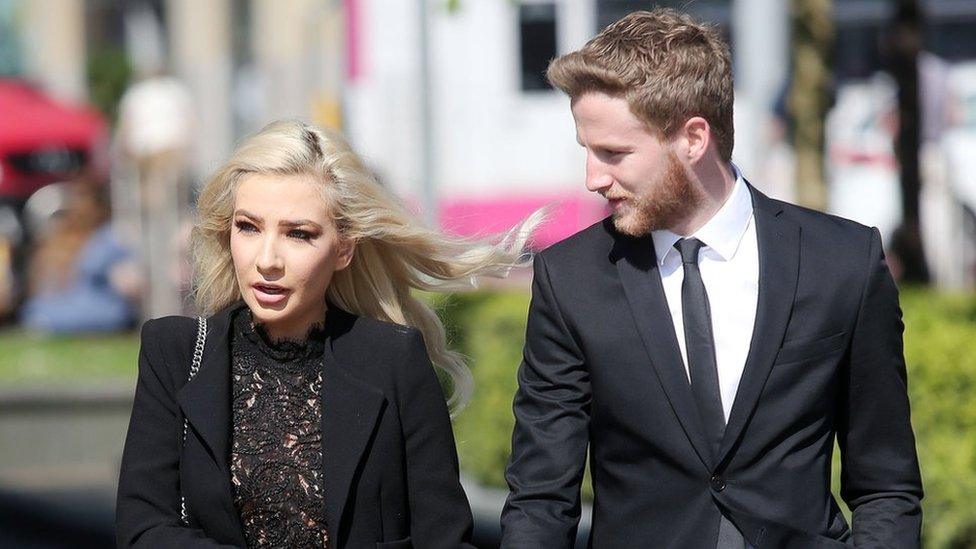Model Lacole and footballer challenge humanist marriage law
- Published

Laura Lacole and Eunan O'Kane are due to get married in Northern Ireland next month
A couple who want their humanist marriage ceremony to be legally recognised are being discriminated against, a court has been told.
Model Laura Lacole is due to marry footballer Eunan O'Kane, in June.
Humanist weddings are not recognised by law in Northern Ireland, so couples must also have a civil ceremony.
However, Northern Ireland's Attorney General John Larkin argued that humanist elements could be incorporated into a civil ceremony.
Mr Larkin told the judge: "That blunts and weakens the case for a separate ceremony."
The Attorney General intervened because the case touches on devolved Stormont legislation.
'Legally meaningless'
Laura Lacole and Republic of Ireland and Leeds United footballer O'Kane attended Friday's judicial review hearing at Belfast High Court to challenge the current legislation.
Before she entered court, Ms Lacole set out her reasons for taking the case.
"We can't see how you can differentiate between any types of beliefs," she said.
"We think it should be recognised in Northern Ireland because there is a need for it."
"Whether we are a minority or a majority we should still be given equal rights."
Opening the case, their lawyer claimed the pair were being denied rights afforded to religious couples.
He said all they were asking for was the same protection afforded to those of different belief systems.
Ms Lacole, from Belfast, and Mr O'Kane, from County Londonderry, have both described themselves as humanists - a non-religious combination of attitudes, ethics and beliefs centred on human experience and welfare.
Humanists adhere to a scientific view of the world and believe humans steer their own destiny.
Ms Lacole, 27, is also vice-chair of Atheist NI.
"Religious people, from pagans to Free Presbyterians and everything in between, enjoy a substantial legal privilege under law," their lawyer said.
He argued that the State "gives its legal blessing to such marriages" but "denies the same privilege to equally valid groups".
Their lawyer added that, as the law stood in Northern Ireland, the couple's wedding on 22 June would be "legally meaningless".
Humanist wedding ceremonies are legally recognised in Scotland and the Republic of Ireland but not in England, Wales or Northern Ireland.
'Vows, music, content'
The couple are taking the judicial review against the General Register Office for Northern Ireland over its decision not to authorise next month's ceremony, which will be conducted by a British Humanist Association celebrant.
The action is also directed at Stormont's Department of Finance for its alleged failure to introduce legislation to allow a legally binding wedding.
Their lawyer told the court the case was of "huge public interest".
He pointed out that were 4,290 humanist weddings in Scotland in 2015 - more than those conducted by the Church of Scotland.
But the attorney general said the applicant had failed to explain what exactly it was they wanted at their ceremony that could not be accommodated in a civil wedding.
"There is a marked paucity of concrete evidence in relation to that," said Mr Larkin.
Philip Henry, representing the General Register Office and Department of Finance, echoed that assertion.
He said "vows, music, content and venue" could be modified in civil ceremonies, as long as it remained non-religious.
The barrister said the only issue was the couple were unable to have their chosen humanist celebrant to marry them legally.
Mr Henry said the important role religion has played in Northern Ireland through history was why such marriages had become enshrined in law.
"That is not a commentary on the quality of one belief over another," he said.
Ms Lacole has pledged to continue the legal battle if the case is unsuccessful.
"If we don't get it, we want to appeal so we can give other people the opportunity to have the wedding ceremony that they want," she said.
- Published9 May 2017
